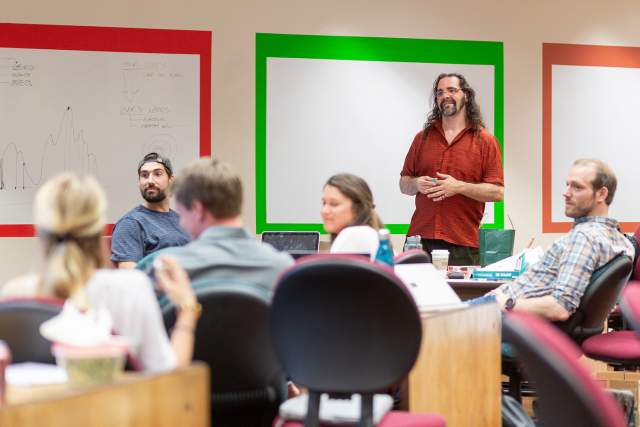“Being in the Incubator has been helpful because it gives us structure when we’re starting from scratch,” Johnson says. “It’s great because it’s such a small community and feels like a safe space to take risks and experiment. It takes guts to put yourself out there, and this community embraces that. I think the Incubator is small but mighty, and I think it has a lot of room to grow.”
Johnson says she was also helped by what she learned in elective courses, such as Entrepreneurship and Innovation Strategy, a class taught by Ron Adner, the David T. McLaughlin D’54, T’55 Professor. She touted the course for helping her discover market opportunities that the ShakaBall team hadn’t thought about previously.
One of the game’s most marketable features lies in its uniqueness. Four players stand in a small circle, taking turns serving a small ball to each other, using wooden paddles bearing the Shaka symbol. It wasn’t uncommon for passersby to stop and ask what the players were up to when playing a game they hadn’t seen before—and ask if they could hop in the circle.
It’s great because it’s such a small community and feels like a safe space to take risks and experiment. It takes guts to put yourself out there, and this community embraces that. I think the Incubator is small but mighty.
Ralli, an entrepreneur twice over as the founder of Clean Marine Energy (which develops clean energy for large ships), says that developing ShakaBall has been a completely different experience for him. This time around he’s been knee-deep in research and development and working alongside manufacturers and suppliers on the prototyping process. “It’s using a totally different skillset, but I am really enjoying it,” he says.
So far, the ShakaBall team has raised more than $10,000 on Kickstarter, and is just starting to develop its sales channels. This summer is crucial for its go-to-market strategy, and the Shaka team will be out spreading the fun on what they’re calling the “Shaka Tour 2019.” They plan to hold events throughout the summer season, starting with the first official tour stop on Cape Cod during Memorial Day weekend. Other stops include Newport, Montauk, and Manhattan Beach. They have already sold about a quarter of the product from their first manufacturing run, which currently retails for forty-nine dollars on their website ShakaBall.com. Going forward, the team is exploring how to best sell ShakaBall: Direct to consumer? Through retail stores?
For Johnson, a former teacher who also worked at IBM, the experience was a highlight of her Tuck education. While she enrolled with a desire to invest in herself and in her career, she still never imagined that she would have helped to launch ShakaBall while in school studying for her MBA.
“I had no idea that this would be how my Tuck experience would end and that we’d be able to create ShakaBall as a family,” Johnson says. “I thought maybe I’d be an entrepreneur in the future, but never did I think it would happen while I was in school at Tuck. I feel incredibly lucky to be here.”
Follow ShakaBall on Instagram at @shakaball.

